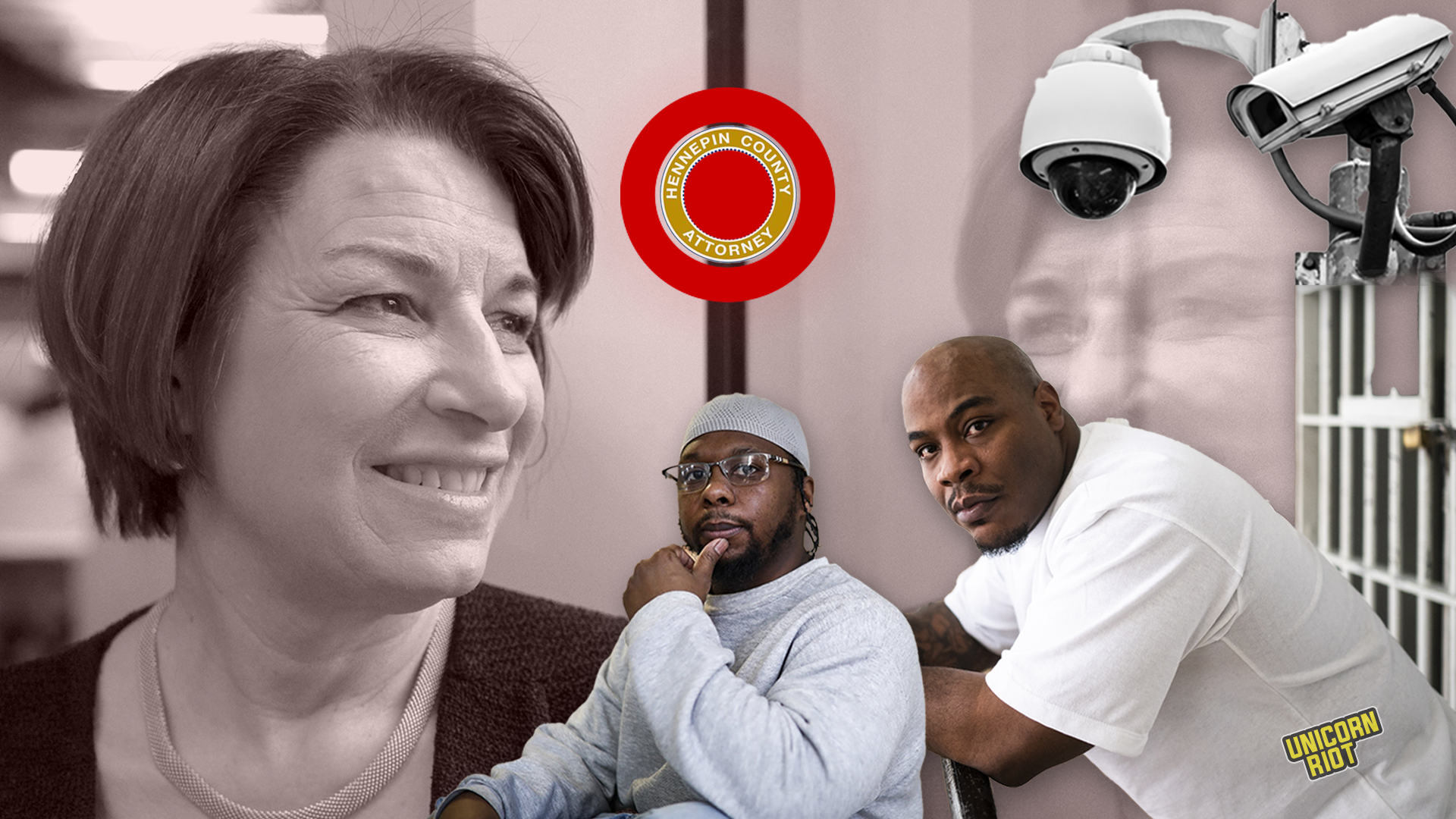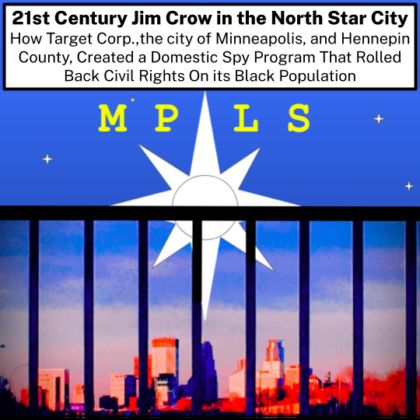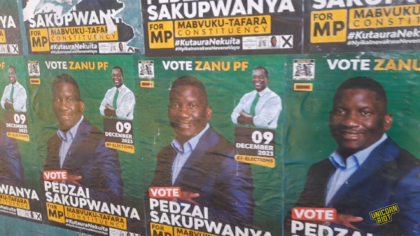How Target Funded a ‘Tough On Crime’ Prosecutor’s Office, Driving Black Youth Incarceration in Minneapolis
Part 11 in the series: 21st Century Jim Crow in the North Star City
Minneapolis, MN — Target Corp. pioneered the Community Prosecution Program in the Hennepin County Attorney’s Office (HCAO) more than two decades ago during the era of mass incarceration. As part of a broad anti-crime campaign that employed new advanced technology and reshaped the criminal justice system in Minneapolis, the program had particularly devastating effects on Black residents.
“The Hennepin County Attorney’s Office and the Minneapolis Police [MPD] colluded with Target Corporation to send legions of Black boys and men to state prison.”
Michelle Gross, Communities United Against Police Brutality
Part 11 in the series: 21st Century Jim Crow in the North Star City
In 2004, a public-private partnership consisting of Target, the Downtown Council, Hennepin County, and the City of Minneapolis launched a sweeping surveillance collaborative in downtown Minneapolis called the SafeZone, as illustrated throughout Unicorn Riot’s years-long investigative series. The SafeZone was created with the stated goal of cracking down on low-level petty street crime and “the perception of crime” in downtown Minneapolis and served as the model for Target’s nationwide Safe City program, which reached more than two dozen cities.
Decades ago, a right-wing think tank developed a “tough on crime” policing practice they named Broken Windows, which theorizes that when small issues, such as broken glass, homelessness, open drug use, etc., go unaddressed, crime becomes increasingly violent. Based on the unproven belief that there’s a relationship between drugs and violence, homeless populations were one primary target of Broken Windows policing, which postulates that focusing law enforcement efforts on minor infractions can prevent and reduce more serious crimes, thus giving way to a new domestic “war.”
The War at Home
The War on Drugs was created by the Nixon White House as a response to the Civil Rights Movement and the left-wing political activity of the 1960s and ‘70s. It led to a flood of federal funds, beginning in the 1980s, which was used to further militarize American law enforcement nationwide and establish anti-crime task forces, combining efforts between local, state, and federal law enforcement agencies and the National Guard. Additionally, the War On Drugs has led to increased penalties, with new federally mandated minimum prison sentencing for petty drug offenders and bloated corrections departments’ budgets in order to warehouse all of the new drug offenders, amongst other things.
Under the pretext of fighting crime, police abuse and corruption during the War on Drugs era was apparently the rule, not the exception. In Minneapolis, former police detective Lt. Michael P. Keefe acknowledged in his book Minneapolis Burning that when he was the commander of the Violent Offender Task Force (VOTF) in 2007, his undercover cops sold cocaine to drug dealers.
“VOTF officers and agents sold Jackson cocaine,” he wrote, “and after several deals Jackson was arrested,” referencing a small-time dealer who allegedly bragged about having MPD officers on his payroll.
Opponents of the War on Drugs maintain that it was designed to target political enemies of the far-right and was really a war on poor Black and brown communities, something one of Nixon’s closest aides eventually admitted to. Both the War on Drugs and the Broken Windows theory have been debunked and called racist by scholars who say it legitimized and normalized aggressive, racialized surveillance such as extralegal “stop and frisk” searches. The effects of this war were devastating, leading to the flagrant police invasion and occupation of communities of color and explosive incarceration rates, consequently rolling back civil rights on Black and brown people, experts assert. Through this new domestic war, the U.S. became the world’s largest jailer, effectively defining this period as the era of mass incarceration.
Target’s public-private partnership was based on the Broken Windows policing theory and part of the larger national drug war.
Public-Private Prototype
The article “How Do We Pay For That: Sustaining Community Prosecution on a Tight Budget” by Robert V. Wolf for The Center for Court Innovation, chronicles the roots of Target’s public-private partnership in Minneapolis. The story Wolf tells is that this new partnership was merely a continuation of MN HEALS (Hope, Education, and Law and Safety), which was launched by Honeywell, the weapons manufacturer, and other corporate stakeholders before the new millennium.
The MN HEALS partnership between public and private sectors was the prototype for renewed right-wing hard-line law enforcement that operated under the guise of restoring “law and order,” employing advanced technology — including the city’s first predictive analytics program CODEFOR (as reported in part 8 of this series) — all purported to curb violent crime.
HEALS was created in response to a wave of violence in Minneapolis after this small, wealthy, overwhelmingly white midwestern city led the nation in homicides per capita in 1995. According to Wolf, the partnership began in 1996 after a story in The New York Times reported that the murder rate in Minneapolis had recently exploded “to be almost 70 percent higher than the rate in New York City. The article also described T-shirts that called Minneapolis ‘Murderapolis.’”
The corporate community in Minneapolis rallied together and enlisted in the drug war in an attempt to reduce crime and change the narrative about the city. They intensified efforts to connect drugs and violence, although no greater connection exists with drugs than with alcohol and violence.
An old report on reducing gun violence published by the U.S. Department of Justice (DOJ) cited a 1998 study by the law enforcement lobby group PERF that concluded: “Narcotics and its relationship with violent crime should be Minnesota HEALS’ next focus.”
That same year, Hennepin County Attorney Mike Freeman, son of former Minnesota Governor Orville Freeman, stepped down from office and unsuccessfully ran for governor. Corporate attorney Amy Klobuchar, Freeman’s handpicked successor, successfully ran a ‘tough on crime’ campaign to replace him as county attorney.
Klobuchar, a Democrat, endorsed the Broken Windows theory on a candidate questionnaire during the campaign and made low-level drug prosecution a priority when she took office.
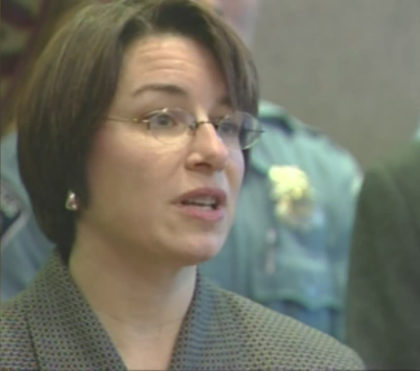
One program that originated from the MN HEALS partnership was the Community Prosecution Program inside the Hennepin County Attorney’s Office under Klobuchar, who is now a U.S. Senator.
More than two decades ago, according to Wolf, the Target Foundation under the HEALS banner began paying the salaries of an attorney and a paralegal who focused on chronic “property crime” offenders in downtown Minneapolis, also known as “quality-of-life” or “livability” crimes, which has become shorthand for anything from shoplifting to public drug consumption.
A Champ For Corps
The new prosecutor proved to be the leader the retail giant was looking for. Prior to Target’s private funding, Klobuchar’s office won convictions for about three repeat offenders a year, but since adding the Community Prosecution Program and installing the downtown surveillance cameras, “the prosecutor now has more than 90 such convictions in a year,” as noted in a 2006 Washington Post article.
The program was so successful it received Target funding for several more years. “Klobuchar’s office is in the process of applying for its fourth annual renewal of the grant,” Wolf said in his 2006 article, dating the funding back to around 2001 or 2002.
A year before George Floyd was murdered by MPD in a viral video that shocked the world and led to global unrest in 2020, Senator Klobuchar came under scrutiny when she ran for President. Her “tough on crime” record as a prosecutor was challenged as she failed to hold police accountable for brutality while wrongfully throwing the book at dozens of innocent Black children for crimes they didn’t commit. Two of those incarcerated children-turned-men, Marvin Haynes and Myon Burrell, were freed by the courts from their life sentences, with what could be more to follow.
During Klobuchar’s two terms as county attorney, over two dozen people were killed by police in Hennepin County and not one officer was charged with murder. Among the many cases Klobuchar refused to prosecute was the 2002 killing of unarmed Black man, Christopher Burns, who was killed by two Minneapolis police officers using a chokehold move that is comparable to the one later used by Derek Chauvin when he murdered Floyd.
Klobuchar’s tenure as Hennepin County Attorney was criticized in the Washington Post for her coziness with the police, her “zero tolerance” prosecution for low-level offenders, and for vowing not to let juvenile crime “go unpunished.”
She responded in the article by saying, “I understand how those words mean something that is not good in the African American community.” Adding, “It makes it sound like you want to put their kids behind bars, and that is not what I did when I was county attorney.”
Yet, despite her denials, the record shows that is exactly what she did.
The same year Klobuchar refused to prosecute Burns’ killers, her office wrongfully prosecuted Myon Burrell for the accidental fatal shooting of 11-year-old Tyesha Edwards during a drive-by. 16-year-old Burrell was charged as an adult, convicted, and sentenced to life in prison for a crime he didn’t commit.
Throughout the years, Klobuchar gloated about locking up the teen during debates and campaign rallies as she sought the Democratic nomination for the U.S. Senate and then the presidency. She ended her presidential run after a 2020 campaign rally in Minnesota was disrupted by protesters calling for Burrell’s release from prison.
Questionable police tactics and faulty eyewitness practices and testimonies had mired Burrell’s case from the very beginning, said Michelle Gross, President of the watchdog group Communities United Against Police Brutality (CUAPB), who noted his false conviction was the result of dirty police work and Klobuchar’s overzealous county attorney’s office.
In 2020, Burrell’s sentence was commuted by the Minnesota Board of Pardons, and he was freed after spending nearly two decades behind bars.
Another high-profile case overseen and badly handled by Amy Klobuchar’s office was the wrongful conviction and sentencing to life of then 16-year-old Marvin Haynes for a 2004 Minneapolis murder. Haynes was exonerated and freed in December 2023 after the court found that his conviction relied on “constitutionally improper” eyewitness evidence. (Unicorn Riot covered Haynes’ case extensively in a four-part investigative series).
Marvin Haynes' sister Marvina connected Myon Burrell & Marvin Haynes' cases, noting they have the "same prosecuting attorney, the same judge, the same investigator."
— UNICORN RIOT (@UR_Ninja) April 5, 2023
She questioned “how many more juveniles” in Minneapolis this has happened to. pic.twitter.com/eVgDV2JLBT
It didn’t start with Burrell nor stop with Haynes; the city’s Black youth were largely blamed for much of the city’s problems during the era of mass incarceration. In a 2007 PERF report, Minneapolis Mayor R.T. Rybak (2002-2014), who was key in establishing Target’s partnership with the city and county, blamed the 21% homicide spike the previous year on “juvenile delinquency.”
Gross, whose group doesn’t accept any corporate funding, shared her thoughts about the nefarious nature of the neoliberal alliance.
“The Hennepin County Attorney’s Office and the Minneapolis Police colluded with Target Corporation to send legions of Black boys and men to state prison,” Gross said, “often on the thinnest of evidence or none at all.”
She believes the corporate “lock ‘em up” approach has made everyone less safe.
“I think it’s really important to look at that era and recognize that putting innocent people in prison because somehow the optics looked right for your re-election campaign … is not a way to make us safer.”
A former Target insider who asked not to be named told Unicorn Riot that Klobuchar was “in deep with Target,” and the relationship needs to be “investigated.”
She was asked about this relationship by PBS’s Margaret Hoover in which Klobuchar responded that she’s not afraid to take on any company.
Klobuchar has received nearly $136,000 in political contributions from Target throughout her career.
Appearance of a Conflict of Interest
Target got the idea to privately fund the Hennepin County Attorney’s Office from a similar program run in the early 1990s in Portland, according to Wolf. But before Target gave any funding to Klobuchar’s office, they studied the pros and cons of such an arrangement to “avoid any appearance of impropriety,” he wrote.
Target and Hennepin County staff researched how other cities handled the appearance of a conflict of interest when private funds paid for prosecution and police services and found that the program in Portland was not initially received well.
“When D.A. Michael Schrunk of Portland hired his first community prosecutor with money from a neighborhood business organization, a local newspaper called the prosecutor a ‘Hired Gun’ in a front-page headline,” Wolf wrote. “Critics quoted in the article suggested that by accepting money from the business group, the D.A.’s Office was for sale and that the rich could ‘buy’ the prosecutor’s services,” an issue Target and Hennepin County hoped to avoid.
Then-Assistant Senior County Attorney Andy LeFevour, who supervised the community prosecution and property crime teams, cited another example in Wolf’s article that was heavily criticized, where law enforcement funds from a business association were used to eliminate crack houses in Atlanta. The problem was that it directly benefited the group that was sponsoring it.
“They were basically buying police services,” LeFevour said. “To avoid a similar situation, the [Hennepin] County Attorney’s Office drew up … a nice, tight agreement [with the Target Foundation] to make sure there were no strings attached,” he added.
However, Klobuchar was quoted in the Washington Post contradicting LeFevour. “There were huge strings attached,” she disclosed. “They don’t just give us money — they demand accountability.” Her office turned over troves of data to Target in exchange for the funding.
“In the past, the DA’s office tracked input numbers [how many criminals were charged], though once we were working with Target, we were required to track output numbers, or how many convictions we get in a year,” Klobuchar said.
The article in the Post emphasized how the for-profit retailer utilized cutting edge technology to fight crime after it created two world-class forensics labs — that it then opened up to law enforcement for free. Police can now “patrol neighborhoods by remote control,” it boasted, because of its partnership with Target Corp.
Although Target has claimed it doesn’t profit financially from its public partnerships, it concedes that its collaboration with law enforcement is central to its business model, which has expanded massively since the partnerships began. It turns out America’s favorite big box store is more in the business of big data and tech than actual retail.
Target’s former vice president of government affairs Nathan K. Garvis told the Post, “In many ways, Target is actually a high-tech company masquerading as a retailer.”
Target learned from the backlash in Portland and Atlanta about the importance of having good press. They hired a business consultant who then planted the Washington Post story quoting Klobuchar and Target execs. The article was published in 2006, the same year Wolf’s article was published, giving Target’s public-private partnership favorable coverage in efforts to get in front of any criticism the project might invoke. (Unicorn Riot covered this extensively in part 7 of this series).
MN HEALS was not referenced at all in the Washington Post article. The public-private partnership was now known as the Target surveillance juggernaut: Safe City.
The Washington Post never disclosed in the article the author’s professional relationship with the retail giant, an apparent conflict of interest. The Minneapolis Star Tribune ran the same fake story a few days later.

Public-Private Partnership Expanded
As covered in part 3 of this series, Target never intended to fund this work permanently and was cautious about associating its name with this public-private partnership. One Target executive disclosed in an old report that “the degree to which he would consider SafeZone successful is the degree to which Target’s name is not associated with it.”
Calls from Target and the Downtown Council for a new downtown business association that specifically focused on public safety began to take shape, and in 2009 the Downtown Improvement District (DID) was established. The DID, of which Target is a member, took over fiscal sponsorship from the retailer for the Community Prosecution Program and the SafeZone surveillance collaborative.
This new consortium only deepened the public-private partnership and its hard-line law enforcement approach.
Then-Mayor Rybak was quoted by the Downtown Journal the year before saying, “Overall, Downtown crime is down significantly … but we want to go further with this. … This is a comprehensive response to the frustration many citizens and I had when we recognized that even increasing our arrests and police presence wouldn’t be enough.”
The Downtown Court Watch program was developed from this partnership to aid the “zero tolerance” prosecution program. Still in existence today, the Court Watch allows downtown business owners and staff to give “community impact statements” that are read in court to describe how “livability” crimes impact company profits. The program allows victims to advocate for geographic restrictions that trespasses offenders from being downtown as a diversion from serving jail time.
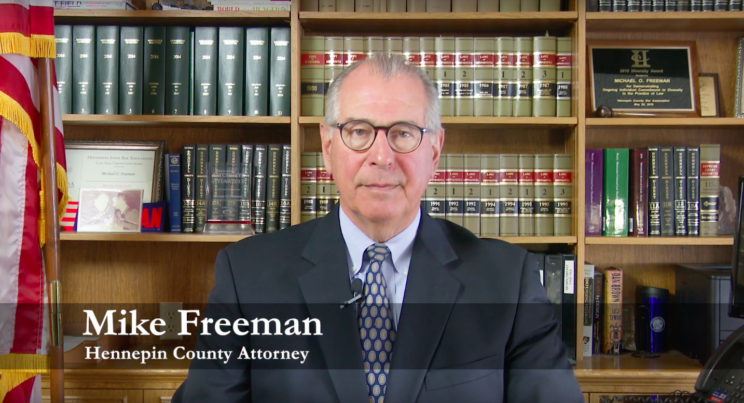
Hennepin County Attorney Mike Freeman was reported in the same article asking Target and the Downtown Council for money to fund its next iteration of mass surveillance — the Downtown 100 Initiative (DT100) — two years before the program actually launched.
The DT100 is essentially a racialized reconnaissance program that was ostensibly designed to reduce these types of low-level offenses. The program is supposedly a list of the top chronic offenders in downtown Minneapolis. Yet, the offender’s list is not tracked based on who has the most arrests or citations but rather the most contacts with a police force that has repeatedly been criticized as racist by the Department of Justice.
Around 2010, Target expanded its Community Prosecution Program to the Minneapolis City Attorney’s Office. Since the HCAO handles felony offenses, the DID began funding a new prosecutor and paralegal in the Minneapolis City Attorney’s Office to help fight the lowest level of crime: misdemeanor and petty misdemeanor offenses, as well as “the perception of crime,” according to a 2011 article by the Minnesota Post.
Under city attorney Susan Segal, an architect of the new surveillance program and now Chief Justice of the Minnesota Court of Appeals, the Community Prosecution Program targeted DT100 offenders by cracking down on things “such as low-level drug and theft offenses, trespassing, open bottle violations, public urination, indecent or disorderly conduct — and low-level felonies.”
The old MinnPost article quoted then-Assistant City Attorney (now District Judge) Regnier Conroy saying that the Community Prosecution Program was successful and received funding for a second prosecutor, but it failed to mention the source of that funding.
Documentation from 2012 shows that the DID “continued” funding in the amount of $150,000 for one prosecutor in the City Attorney’s Office and one community probation officer who was subcontracted with Hennepin County and assigned specifically to work with the DT100 program.
The Downside of Privately Funded ‘Justice’
Author Robert V. Wolf said that it was important for Target Corp. to address the ethical optics of a corporation funding the police and the prosecutor’s office. After that was addressed, Wolf asked prosecutors, “is there a downside to accepting donations from local sources?” to which many of them responded, “Not really.”
However, observers say the program’s aggressive tactics have led to police targeting people for behavior that doesn’t actually meet the criteria for crime, all in order to keep Black people from downtown. Opponents of the DT100 program say expansive police surveillance due to an extensive network of downtown surveillance cameras and “stop and frisk” police searches have given renewed energy to racist antiquated policies that have granted police sweeping discretion in who they target. This has resulted in downtown cops overwhelmingly targeting African Americans for broad, often, victimless offenses such as loitering, jaywalking, and spitting on the ground.
In 2009, MPD admitted that this was less about public safety and more about the “widespread feeling … that the downtown business district was not a pleasant place to work or visit. … Even though there was relatively little violent crime in the downtown area, people tended not to feel safe or comfortable there,” according to a joint report created by PERF and Target Corp.
Furthermore, as covered in part 3 of this series, the following remarks by MPD Deputy Chief Rob Allen at Target headquarters in 2010 suggest that the department treated perceived crime the same way as actual crime:
“It sounds silly, but the word that people used to describe the downtown area was ‘icky.’ So we asked exactly what they meant by this ‘ick factor,’ and they told us that when they came downtown, they were bothered by lifestyle offenders—people who were panhandling, loitering, swearing, urinating in public, and so on.”
America’s retail darling came under fire after activists dug up an old quote from a Target exec who compared tracking alleged criminals to tracking commercial product inventory. “It struck me that following repeat criminals was really an inventory-management problem,” according to the same article written by the Target business consultant.
We often say incarceration is "warehousing" of people, a continuation of enslavement treating humans as property. That's exactly how @Target Vice President @nategarvis explained their role: "It struck me that following repeat criminals was really an inventory-management problem." pic.twitter.com/RapEfSv3Sg
— Stop LAPD Spying Coalition (@stoplapdspying) March 22, 2021
As noted in part 4 of this series, experts say such policies have dire consequences for Black youths particularly with roots in post-Civil War segregation laws known as Black Codes, which were designed to criminalize and re-enslave Black people.
Dr. Keith Mayes, Professor of African and African American Studies at the University of Minnesota, told Unicorn Riot there’s a direct link between corporate politics and plantation politics.
“Coming out of slavery, vagrancy laws … were critical for white police officers to attack young Black people,” he said. “You can draw a direct line between 2011 and ‘12 when we started to see [the DT100] emerge in Minneapolis, all the way back to the 1860s and ‘70s.”
(Unicorn Riot has covered the Downtown 100 and reactions to the program extensively in parts 1, 3, and 4 of this series).
Gross told Unicorn Riot that the public-private partnership has resulted in criminal justice and law enforcement relinquishing unprecedented power to corporations — a change which has harmed Black residents the most.
“The fact that this was sort of the routine way these folks operated in these cases, it sort of helps to explain why during the tenure of Klobuchar and then Mike Freeman, the jails and prisons [in Minnesota] became the Blackest places in the whole damn state.”
Michelle Gross
A Case Like the Others
Gross spoke about a 2010 case that bears striking resemblance to both Haynes and Burrell’s cases, which was prosecuted by Klobuchar’s successor Mike Freeman who reclaimed his old office after Klobuchar ascended to the U.S. Senate.
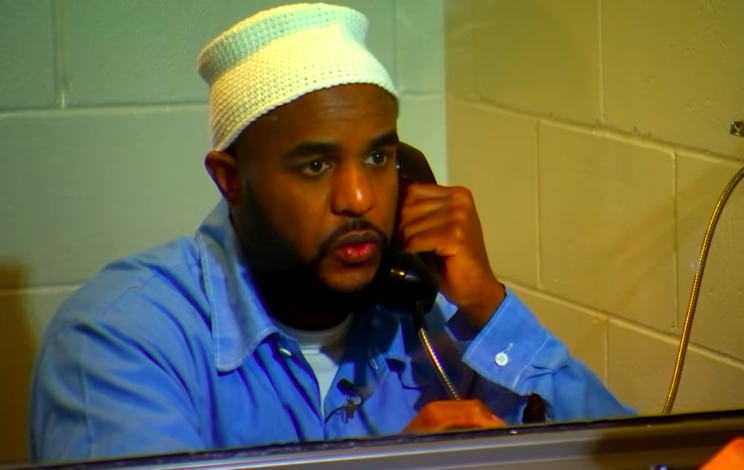
Mahdi Ali was convicted and given a life sentence for a 2010 triple murder in South Minneapolis, gruesome crimes that he said he didn’t commit.
Ali was 15 years old when the murders of Anwar Mohammed, Osman Elmi, and Mohamed Warfa occurred at the Seward Market convenience store near his home. Like Haynes and Burrell, he has always maintained his innocence.
Gross also believes Ali is innocent. She said his case is important because “it connects to all the other cases where provably innocent people were sent to prison during a campaign of terror on Black and brown bodies in [Hennepin] county.” She said Target had “a heavy footprint on this case.”
During Ali’s 2011 trial, a Target forensics analyst testified in court that the pants worn by the killer shown in the surveillance video from the convenience store “appeared to be similar to a pair of jeans police seized from Ali’s apartment days after the shooting.”
It was never revealed by prosecutors during Ali’s trial that Target funded the Minneapolis Police, the city attorney’s office, and the county attorney’s office, where the presiding judge formerly worked. It wasn’t until Ali’s attorney unearthed the multinational corporation’s funding to the county attorney’s office did the jury hear about this relationship.* At a fair trial, it should’ve been, Gross insists.
“The prosecution has a duty to disclose all exculpatory matters, all kinds of things that talk about any outside involvement, things like that. All of that should’ve been disclosed.”
Ali is serving out his life sentence given by the former “tough on crime” prosecutor turned judge, Peter Cahill, the same judge who oversaw the conviction of Derek Chauvin. “He becomes a judge, and he’s still got that prosecutorial mindset,” Gross said. “‘We gotta get these guys. We gotta put them away.’”
She said the “tough on crime” era devastated Twin Cities families.
“Not only did this devastate the falsely accused and their families, but also the families of victims were denied justice.”
Insight From a Former Target Insider
As detailed in part 7 of this series, a former Target insider who wishes to remain anonymous told Unicorn Riot that founding Target Corp. CEO Robert Ulrich is racist and advocated for bringing back the death penalty in Minnesota. They described an unforgettable meeting two decades ago when the CEO made a shocking comment about people he called “lawbreakers.”
“I don’t just believe in the electric chair; I believe in the ‘electric couch.’ Line ‘em up!,” they recalled him saying.
They shared that it was an open secret inside Target’s leadership that Ulrich was racist and casually used the “N-word” to refer to Black men hanging outside in front of Target’s flagship store in downtown Minneapolis.
Ulrich was president of the Dayton Hudson Corporation for years before becoming Target’s first CEO. He was in charge of Target when it took over its parent company in 2000 during the rise of the public-private partnership and moved its headquarters to downtown Minneapolis, making it the largest employer in downtown until recently.
His hard-line right-wing views and his close relationships with prosecutors and police were instrumental in shaping Safe City policies. The former Target insider confirmed that the retailer’s “law and order” policies were not in good faith but were anti-Black in nature, and Ulrich’s influence was apparent.
“He was very cozy with Klobuchar and law enforcement,” they divulged.
This amounted to Target paying to prosecute its self-professed enemies: Black people.
Unicorn Riot made several attempts to reach Ulrich for a response with no luck.
The State of Prosecution in Minneapolis
With all the precautions Target took to avoid the optics of impropriety, it all seemed to go out the window in the days following George Floyd’s murder with one of its South Minneapolis stores being ransacked and looted as well as an attempted arson at its headquarters in downtown Minneapolis.
Target executive Jim Rowader, who was notorious for union busting efforts against Target workers, was appointed Minneapolis City Attorney by Mayor Jacob Frey within weeks after the George Floyd Uprising. During his tenure as lead counsel for the city enterprise, Rowader was not required to divest from his holdings in Target Corp. but rather file a Statement of Economic Interest, per city policy. Rowader stepped down in 2022 after serving for less than two years.
[You can view Rowader’s Statement of Economic Interest here.]
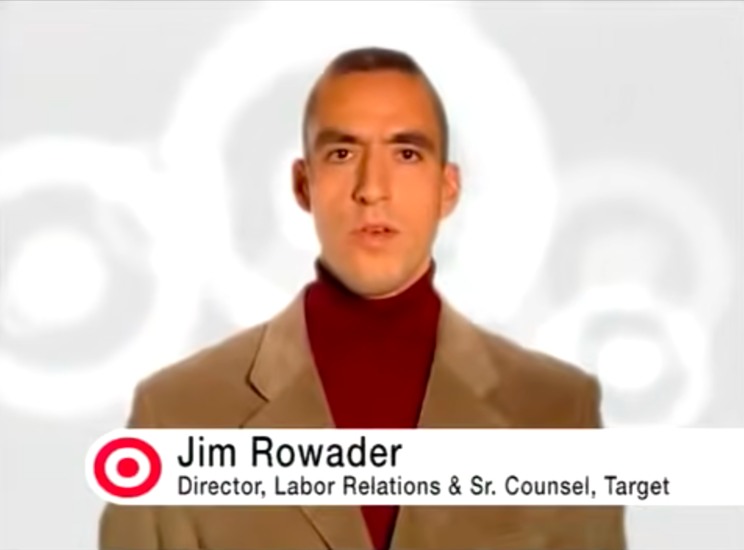
His replacement, the current City Attorney Kristyn Anderson, has also proven to be a darling of corporate interests. Her most recent move comes just weeks after an election where ‘progressives’ won a majority and included a proposal to strip the city council and voters of power while transferring more decision making to the conservative unelected charter commission.
The unelected group of Charter Commissioners, filled with conservatives, Republicans, and lobbyists has seized the power to shape our city governance without ever having to earn a resident vote. Their vision is a unitary boss city. They like a patronage system. https://t.co/wgJnGQox3J
— D.A. Bullock (@BullyCreative) December 31, 2023
Mary Moriarty, the current Hennepin County Attorney, was elected in 2022 on a mandate of change after activists unsuccessfully tried to recall Mike Freeman, her predecessor, for refusing to hold police accountable for murdering unarmed Black men, including the cops who murdered Floyd. After the recall campaign failed in 2021, public pressure mounted on Freeman and he announced he would not seek re-election. Moriarty seized the opportunity and campaigned on ending the “zero tolerance,” “lock ‘em up” approach that earned Freeman so much backlash and pledged to reform the office. She won 58% of the vote in a decisive victory against Martha Holton Dimick, a “law and order” candidate.
One year into office, Moriarty is following through on several campaign promises. On January 24 she charged state trooper Ryan Londregan with murder for the July 31 killing of Black motorist Ricky Cobb II during a traffic stop.
Two days later on January 26, Moriarty announced that her office would be prosecuting wage theft and that an attorney was hired to head the new Worker Protection Unit dedicated to investigating and prosecuting Hennepin County employers who steal their staff’s wages. Target has long been accused of wage theft by its workers in the U.S. and in foreign countries where it does business, and its delivery service, Shipt, is currently being sued by the Minnesota Attorney General’s Office.
And shortly after the new year, Moriarty announced a new process to ensure the HCAO is complying with the law that requires prosecutors to give defendants any materials related to police misconduct or discipline that may help their case in court.
The reformer Moriarty faces non-stop attacks from police and right-wing critics for her success in reducing juvenile punishment and incarceration in Hennepin County, also a campaign promise, and for what opponents say is a war against cops. Trooper Londregan’s attorney Chris Madel called Moriarty “out of control” and referred to the recent charges as “open season on law enforcement.”
Today, the HCAO still employs its Community Prosecution Program, although Moriarty told a small audience in October that neither Target nor the DID are currently funding any attorneys in her office. While attending the #NoKidsInPrison art installation in St. Paul last October featuring an exhibit called TARGET(ing) Youth, inspired by Target Corp, MPD, and the HCAO’s partnership, Moriarty fielded questions from Unicorn Riot and a group of youth activists with the Legal Rights Center.
‘We Need to Make Right’
The criticism of using private funding to pay for “hired guns” remains relevant today.
Michelle Gross said it was not by accident that this era saw the mass incarceration of communities of color.
“We had the Klobuchar era. We had the Freeman era before and after her,” she explained. “And these have been eras where literally the goal was to lock up as many Black and brown bodies as possible.”
The research in this investigative series illustrates that neither Minneapolis nor Hennepin County authorities demonstrated independence from their corporate funder but rather engaged in a right-wing, anti-Black incarceration campaign that inflated crime narratives at the behest of Target and other corporate interests, a demonstrated pattern by the multinational retailer that has recently made headlines.
The decades-old, corporate-driven “tough on crime” policies have had lasting effects and, in reality, according to Gross, were not in the best interest of public safety.
“The community was endangered because the real perpetrators were allowed to remain free and possibly hurt others.”
Yet, Gross said, justice still has to be served.
“This was an era that was rife with racism, rife with ‘lock ‘em up mentality. And we need to rectify that. And more than that, more than anything,” she said, “we need to make right with what has happened to innocent people who have been put away under this system.”
*[Correction 6.6.24] The previous version incorrectly stated that Target’s funding for the county attorney’s office was not disclosed in court, based on information we obtained from Mahdi Ali. However, upon further investigation, we learned that Ali’s defense attorney did mention this at trial. This story has been updated for accuracy.
Research for this report was done in partnership with students from the Community Justice Project at the University of St. Thomas Law School.
Cover image featuring images via NPR (Amy Klobuchar), MPR (Myon Burrell), Star Tribune/Aaron Lavinsky (Marvin Haynes), Target, and Hennepin County Attorney’s Office – created by Niko Georgiades for Unicorn Riot.
Follow us on X (aka Twitter), Facebook, YouTube, Vimeo, Instagram, Mastodon, Threads, BlueSky and Patreon.
Please consider a tax-deductible donation to help sustain our horizontally-organized, non-profit media organization:

